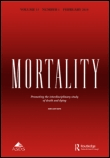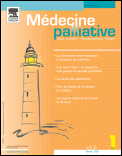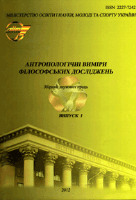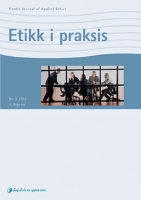
Mortality
Scope & Guideline
Illuminating Perspectives on Mortality
Introduction
Aims and Scopes
- Interdisciplinary Perspectives on Death and Dying:
The journal encourages contributions that draw from various disciplines, including sociology, anthropology, psychology, and medicine, to provide a holistic understanding of death and its implications. - Cultural Practices and Rituals:
A core area of focus is the examination of cultural practices surrounding death, including funerary rituals, mourning traditions, and the societal implications of these practices. - Impact of Modernity and Technology:
The journal addresses how modernity and technology influence perceptions of death, including digital memorialization, online grief, and the changing landscape of funerary practices. - Palliative Care and End-of-Life Issues:
Research on palliative care, compassionate end-of-life practices, and patient and caregiver experiences is a significant aspect of the journal's scope. - Social Justice and Marginalized Mortality:
The journal explores issues of social justice related to death, including disparities in care and the experiences of marginalized communities in facing death and bereavement. - Philosophical and Ethical Considerations:
Contributions that delve into the philosophical and ethical dimensions of death, including assisted dying, bioethics, and the implications of mortality in contemporary society, are also emphasized.
Trending and Emerging
- COVID-19 and Mortality:
The pandemic has catalyzed a surge in research addressing death and dying in the context of COVID-19, focusing on grief, bereavement practices, and the implications of pandemic-related restrictions. - Digital Death and Online Memorialization:
Emerging themes around digital death, including online memorials, social media's role in grieving, and virtual funerals, reflect a shift in how society engages with mortality in the digital age. - Environmental Considerations in Death Practices:
An increasing number of studies explore the environmental impact of death practices, such as green burials and sustainable cremation methods, highlighting a growing awareness of ecological issues. - Intersections of Death with Social Justice:
Research that examines the intersections of death with social justice issues, including race, gender, and economic disparities, is gaining traction, indicating a broader sociopolitical engagement. - Narrative and Creative Approaches to Grief:
There is a notable rise in the use of narrative and creative methodologies to explore grief, including arts-based research and personal storytelling, which enrich the understanding of bereavement experiences.
Declining or Waning
- Historical Perspectives on Death:
There has been a noticeable reduction in papers focusing solely on historical analyses of death practices, indicating a shift towards contemporary issues and practices. - Theoretical Discourse on Death:
Discussions centered around abstract theoretical frameworks of death, while still present, appear less frequently compared to empirical studies and applied research. - Traditional Medical Models of Dying:
There seems to be a waning interest in traditional medical approaches to dying, as the journal increasingly favors holistic, patient-centered, and culturally sensitive perspectives. - Focus on Celebrity Deaths and Popular Culture:
The exploration of celebrity deaths and their cultural impact has diminished, suggesting a preference for more substantive, research-driven investigations into societal attitudes toward mortality. - Static Views on Grief and Mourning:
There is a decline in papers presenting static or singular views on grief, with a growing emphasis on dynamic and contextual understandings of mourning processes.
Similar Journals

Universitas Medica
Bridging gaps in knowledge for a healthier world.Universitas Medica is a prominent journal dedicated to advancing the field of medical sciences, published by the Pontificia Universidad Javeriana, Facultad de Medicina. Since its transition to an Open Access format in 2010, it has played a pivotal role in promoting the dissemination of high-quality medical research. Featuring a diverse array of studies encompassing clinical practice, public health, and medical education, Universitas Medica aims to provide researchers, healthcare professionals, and students with invaluable insights and the latest findings in medicine. With a focus on enhancing accessibility and fostering collaboration across the medical community, this journal stands out as a critical resource for those looking to stay abreast of innovations and trends. The journal is indexed under ISSN 0041-9095 and E-ISSN 2011-0839 and operates from its base in Bogotá, Colombia, contributing significantly to the scientific landscape both regionally and internationally.

THEORETICAL MEDICINE AND BIOETHICS
Challenging Conventional Thought in Theoretical Medicine.THEORETICAL MEDICINE AND BIOETHICS, published by SPRINGER, is an esteemed journal dedicated to exploring the complex intersections of medicine, ethics, and law. With its ISSN 1386-7415 and E-ISSN 1573-1200, this journal serves as a vital platform for scholars, practitioners, and students interested in the ethical implications of medical practices and innovations. Although it currently holds a Q4 impact factor in the categories of Issues, Ethics and Legal Aspects and Medicine (Miscellaneous) as of 2023, its relevance is amplified by its commitment to fostering critical discourse in a rapidly evolving field. The journal features a diverse range of articles that address profound ethical dilemmas in healthcare, making it a significant resource for contemporary research from 1997 to the present. As an open-access journal, it ensures that cutting-edge knowledge is readily available, inviting contributions that challenge conventional thought and advance the field of bioethics.

Medecine Palliative
Shaping the Future of Anesthesiology and Oncology.Medecine Palliative is a distinguished journal published by Elsevier, dedicated to the vital field of palliative care and pain management. With an ISSN of 1636-6522 and E-ISSN 2213-0098, this international journal has been an essential resource since its inception in 1970, currently covering research from 2004 to 2024. The journal reflects a commitment to enhancing the quality of life for patients facing serious illnesses, addressing critical issues in Anesthesiology and Oncology, while fostering innovative nursing practices in palliative care. While the journal holds a Q3 ranking in Anesthesiology and Pain Medicine and a Q4 in Oncology categories, making it a valuable venue for researchers and practitioners aiming to contribute to the evolving landscape of palliative medicine. Despite its lower rank in some categories, the journal serves as an important platform for insights, clinical findings, and current practices that can significantly impact patient care. Medecine Palliative is accessible to researchers, professionals, and students who are eager to explore the latest advancements and evidence-based approaches in end-of-life care.

Anthropological Measurements of Philosophical Research
Advancing Knowledge through Interdisciplinary InsightsAnthropological Measurements of Philosophical Research is a distinguished open-access journal published by the ACAD V LAZARYAN DNIPROPETROVSK NATL RAILWAY TRANSPORT UNIV, dedicated to advancing interdisciplinary scholarship at the intersection of anthropology and philosophy. Since its inception in 2012, this journal has provided an invaluable platform for researchers, professionals, and students to disseminate innovative ideas and research findings, thereby fostering a deeper understanding of anthropological principles applied to philosophical inquiries. The journal encourages submissions that explore theoretical frameworks, longitudinal studies, and methodological advancements within this complex field. With a commitment to accessibility, it operates under an open access model, facilitating wider dissemination and engagement with its content. Situated in Dnipro, Ukraine, this journal aspires to contribute significantly to global discourses on cultural and philosophical dimensions of human experience, making it essential reading for anyone interested in these critical areas of study. Scholars focused on developing multidisciplinary approaches will find Anthropological Measurements of Philosophical Research an indispensable resource in their academic pursuits.

BMC Medical Ethics
Navigating the complexities of healthcare ethics.BMC Medical Ethics is a leading open-access journal dedicated to the critical exploration and dissemination of knowledge surrounding ethical issues in healthcare and medicine. Published by BMC, and headquartered in the United Kingdom, this journal has become a cornerstone in the field since its inception in 2000, with a remarkable focus on health policy, nursing ethics, and the complex legal aspects intertwining with healthcare practices. With an impressive Q1 ranking across multiple categories, including Health Policy and Health (Social Science), it ranks among the top journals globally—particularly notable with its Scopus rankings reflecting a strong 85th percentile in Nursing and an 81st percentile in Social Sciences. As an open-access publication, BMC Medical Ethics ensures that research findings are readily accessible, fostering a collaborative environment for researchers, practitioners, and students alike. The journal's commitment to ethical discourse not only advances academic inquiry but also shapes the practices and policies that govern healthcare delivery; thus, making it an invaluable resource for those engaged in the advancement of medical ethics.

Haser-Revista Internacional de Filosofia Aplicada
Illuminating Contemporary Issues through Philosophical InquiryHaser-Revista Internacional de Filosofia Aplicada is a distinguished academic journal published by UNIV SEVILLA, EDITORIAL, based in Spain. With an ISSN of 2172-055X and an E-ISSN of 2386-4761, this journal specializes in the field of applied philosophy, a vital intersection of theoretical frameworks and practical implementation that addresses contemporary issues. Since its inception in 2019, Haser has aimed at fostering interdisciplinary dialogue and advancing scholarship within philosophical disciplines. Although currently categorized in the Q4 quartile in Philosophy and positioned at rank #401 out of 806 in Scopus, its contributions are increasingly recognized, appealing to researchers, professionals, and students seeking to explore philosophical applications in the modern context. The journal maintains a commitment to open access to enhance visibility and dissemination of research. The editorial office is located at SECRETARIADO PUBLICACIONES, C/ PORVENIR, NO 27, SEVILLE 41013, SPAIN. Join an engaging academic community dedicated to enriching philosophy's relevance in societal discourse through meaningful contributions.

ANTIQVORVM PHILOSOPHIA-An International journal
Bridging Ancient Wisdom with Modern InquiryANTIQVORVM PHILOSOPHIA is an esteemed international journal dedicated to the exploration and scholarly examination of Classics, History, Linguistics, and Philosophy. Published by FABRIZIO SERRA EDITORE, this journal is pivotal for researchers and scholars who seek to contribute to the evolving discourse in these fields. With the ISSN number 1973-5030 and an E-ISSN of 1974-4501, it offers a platform for original research, critical essays, and interdisciplinary studies that bridge the rich heritage of classical scholarship with contemporary analysis. The journal has successfully converged from 2019 to 2023, achieving a notable presence in the academic community, evidenced by its Q4 rankings across multiple categories in 2023. Despite its current positioning, ANTIQVORVM PHILOSOPHIA remains committed to promoting high-quality research that advances understanding and fosters dialogue within its scholarly realms. It is particularly insightful for graduate students, professionals, and academic researchers striving to navigate the intricate intersections of language, history, and philosophy. For authors looking to disseminate their work to an engaged audience, ANTIQVORVM PHILOSOPHIA serves as a valuable venue for enhancing academic visibility and impact.

NanoEthics
Innovating Thought Leadership in Nanotechnology EthicsNanoEthics is a pioneering journal published by Springer, dedicated to exploring the complex intersections of nanotechnology and ethical considerations. With an ISSN of 1871-4757 and an E-ISSN of 1871-4765, this influential journal has steadily progressed since its inception in 2007, sustaining high academic standards and relevance through 2024. It is notably positioned in the Q1 category for History and Philosophy of Science and Philosophy, reflecting its significant impact in these disciplines, and holds commendable rankings in several other categories, including Social Sciences and Management of Technology and Innovation. With its commitment to fostering rigorous dialogues and interdisciplinary research, NanoEthics serves as an essential platform for researchers, professionals, and students engaged in understanding the socio-ethical dimensions of nanoscience. The journal's comprehensive scope invites contributions that challenge conventional paradigms, encouraging innovative thought leadership in the realms of technology and ethics.

Etikk i Praksis
Empowering Scholars to Transform Ethical PracticesEtikk i Praksis is an influential peer-reviewed journal dedicated to advancing the discourse surrounding ethical practices and philosophical inquiry. Published by Akademika AS under the esteemed Akademika Forlag banner, this journal has been a vital resource in the field of ethics since its transition to Open Access in 2007, ensuring that cutting-edge research is accessible to all. Based in Norway, the journal has carved a niche within the philosophy discipline, currently holding a Q3 quartile ranking, with a commendable position of #352 out of 806 in the Scopus Arts and Humanities - Philosophy rankings. Its convergence years extend from 2011 to 2024, positioning it as a continually relevant platform for scholarly contributions. With an emphasis on practical applications of ethical theory, Etikk i Praksis serves as an essential journal for researchers, professionals, and students aiming to deepen their understanding and explore contemporary ethical challenges.

JOURNAL OF DHARMA
Bridging Minds: Where Philosophy Meets SpiritualityWelcome to the JOURNAL OF DHARMA, a distinguished publication in the realms of Philosophy and Religious Studies, published by Dharmaram College, India. This journal has carved out a niche in academic scholarship, achieving notable rankings in Scopus—#374 in Religious Studies and #511 in Philosophy—demonstrating its relevance and contribution to the respective fields. With its scope encompassing a diverse range of topics from philosophical inquiry to religious discourse, the journal reflects a commitment to promoting critical dialogue and interdisciplinary research. Although it operates without an open-access model, the JOURNAL OF DHARMA invites contributions from researchers, professionals, and students keen on exploring the intricacies of human thought and spiritual practices. As it continues to evolve, the journal remains a key resource for those seeking to deepen their understanding of philosophical and religious inquiries from 2002 to 2024.